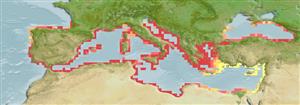Common names from other countries
>
Syngnathiformes (Pipefishes and seahorses) >
Syngnathidae (Pipefishes and seahorses) > Syngnathinae
Etymology: Syngnathus: Greek, syn, symphysis = grown together + Greek, gnathos = jaw (Ref. 45335).
More on author: Risso.
Environment: milieu / climate zone / depth range / distribution range
Ecología
marino; agua dulce; salobre demersal; amphidromous? (Ref. 51243); rango de profundidad 0 - 5 m (Ref. 6733). Subtropical; 45°N - 30°N, 10°W - 42°E
Eastern Atlantic: southern Biscay to Gibraltar, and also the Mediterranean and Black seas. Introduced and became established in the former USSR.
Tamaño / Peso / Age
Maturity: Lm ? range ? - ? cm
Max length : 22.1 cm SL macho / no sexado; (Ref. 94846)
Euryhaline, found among detritus or vegetation over sand or mud, within a temperature range of 8° to 24°C. Probably an amphidromous species (Ref. 51243) but migratory behavior needs verification. Ovoviviparous (Ref. 205). The male carries the eggs in a brood pouch which is found under the tail (Ref. 205). Early free-living young measure 23 mm TL (Ref. 6733).
Females lay 10-60 eggs into a brood pouch on ventral surface of tail of males. Males fertilize the eggs as they enter the pouch. Eggs incubate in the male´s brood pouch for about 20-32 days, depending of temperature. (Ref.59043).
Dawson, C.E., 1986. Syngnathidae. p. 628-639. In P.J.P. Whitehead, M.-L. Bauchot, J.-C. Hureau, J. Nielsen and E. Tortonese (eds.) Fishes of the North-eastern Atlantic and the Mediterranean. Volume 2. Unesco, Paris. (Ref. 6733)
IUCN Red List Status (Ref. 130435)
CITES (Ref. 128078)
Not Evaluated
Threat to humans
Harmless
Human uses
Más información
ReferenciasAcuiculturaPerfil de acuiculturaRazasGenéticaElectrophoresesheritabilidadEnfermedadesProcesamientoMass conversion
Herramientas
Special reports
Download XML
Fuentes de Internet
Estimates based on models
Preferred temperature (Ref.
115969): 15.2 - 21.4, mean 18.8 (based on 552 cells).
Phylogenetic diversity index (Ref.
82804): PD
50 = 0.5000 [Uniqueness, from 0.5 = low to 2.0 = high].
Bayesian length-weight: a=0.00025 (0.00020 - 0.00031), b=3.23 (3.18 - 3.28), in cm Total Length, based on LWR estimates for this species (Ref.
93245).
Nivel trófico (Ref.
69278): 3.2 ±0.40 se; based on food items.
Resiliencia (Ref.
120179): Alto, población duplicada en un tiempo mínimo inferior a 15 meses (Preliminary K or Fecundity.).
Fishing Vulnerability (Ref.
59153): Moderate vulnerability (36 of 100).
